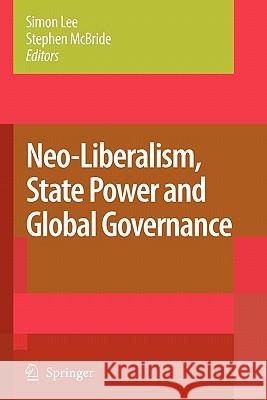Neo-Liberalism, State Power and Global Governance » książka
Neo-Liberalism, State Power and Global Governance
ISBN-13: 9789048175710 / Angielski / Miękka / 2010 / 270 str.
This volume explores some of the ways in which neo-liberalism has affected both the exercise of state power and the conduct of global governance in the cont- porary global economy. While the contributors have approached their subject from a variety of social science perspectives, their research is united by a number of underlying themes. First, neo-liberalism has failed to deliver a framework for state power and global governance capable of delivering stability and enduring prosperity. Second, the role of the politics in general, and the state and global governance in particular, should be defined more broadly than the simple neo-liberal construction of institutions for the market. There is an urgent need for the re-balancing of state power and global governance in favour of the public domain of the state and citizenship, in order to redress some of the inequalities bequeathed by three decades of liberalization, privatization, and de-regulation. Third, the degree to which globalization has undermined the policy autonomy of the de- cratic state has been overstated in many cases. While many poorer developing economies have been presented with a developmental fait accompli, for many more affluent polities, neo-liberal globalization has been a deliberate policy choice. As a consequence, any analysis of the impact of neo-liberalism upon state power and global governance must acknowledge the importance of context, including the role played by society, historical traditions, and culture, in mediating the effects of neo-liberalism.











